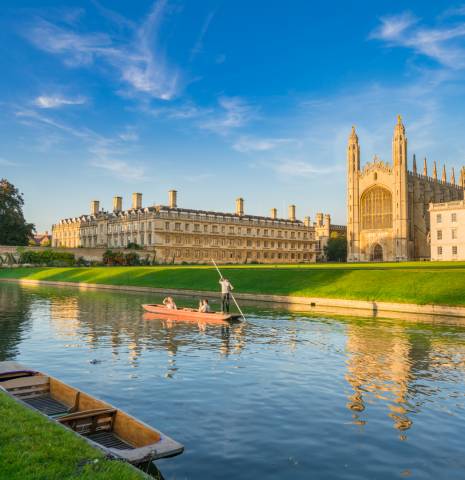
Four of England's key health & life sciences hubs
With over 6,000 life science companies and £80 billion already committed to research and development over the next ten years, discover the four English destinations at the forefront of the health and life science sector.
Birmingham, Central England
Birmingham
Sitting at the forefront of medical advancement, Birmingham and the West Midlands is well-known for their contribution to life sciences. It was in Birmingham where John Hall-Edwards took the first X-ray image of a human spine, pioneering the use of radiation for medical science.
Home to more MedTech companies than any other region in the UK, Birmingham and the West Midlands host 35 centres of clinical research excellence, 2 data research hubs and the largest genomics lab hub in the UK.
The region also facilitates access to highly skilled professionals, including 24,000 professionals working across the healthcare, bio-pharma and medical devices sectors. Additionally, event planners can benefit from Birmingham and the West Midlands' great talent pool as the region is home to four leading medical schools, getting 87,000 STEM students and 11,000 medical graduates per year.
With a recognised world-class research infrastructure, the region has been at the forefront of product testing, and pharmaceuticals and medical developments.
Birmingham and the West Midlands' life science strength is expected to get even stronger from next year with the Birmingham Health Innovation Campus (BHIC) opening. Set to become a world-leading healthcare technologies hub, the campus will offer high-quality laboratory, office, incubation and innovation facilities, combining academic, clinical and commercial power to harness and accelerate life sciences research.
Find out more
Liverpool, North England
Liverpool
A pioneer in health and life sciences, Liverpool is widely known for driving innovation and specialisation in infection, tropical diseases, precision medicine, children’s health and veterinary science.
Home to more than 8,000 core life science students, Liverpool has the largest concentration of bio-manufacturing in Europe. Its renowned Liverpool School of Tropical Medicine (LSTM) was the first institution in the world dedicated to tropical medicine research and teaching. Today, LSTM students are at the forefront of the fight against malaria and other insect-borne diseases.
In addition to the Liverpool School of Tropical Medicine, Liverpool is also home to the University of Liverpool, Liverpool John Moores University and the Royal Liverpool University Hospital. Together, these four universities bring Liverpool a great range of expertise in different life sciences fields, from sports to brain and behaviour to cancer, facilitating powerful, productive collaborations with industry experts from all over the world.
With high-end business event facilities, including an interconnected arena, conference and exhibition centre, Liverpool has been the chosen destination for large, international health and life sciences events. Over the next months, Liverpool will host the International Conference on Medical and Health Sciences, the Congress of the European Society of Pediatric Otorhinolaryngology and the 60th Congress of the European Calcified Tissue Society.
Find out moreCambridge, Central England
Cambridge
Cambridge has established itself as a major life sciences business hub, particularly in the MedTech and Bioscience sectors. Home to the Cambridge Biomedical Campus and global R&D headquarters of AstraZeneca, Cambridge has been at the forefront of precision medicine, AI and machine learning in healthcare, and medical robotics.
With over 20 Nobel prizes in medical sciences and 38 venues awarded with the official seal of approval by the Meetings Industry Association, Cambridge combines the best of facilities and expertise, making it an outstanding destination for congresses and conferences. This year, Cambridge has hosted the 11th Symposium for the International Association of Veterinary Rehabilitation and Physical Therapy and the 20th Biennial Congress of the European Psychiatric Association, which took place in Cambridge for the second time.
With a strong Ambassador Programme, Cambridge will host the International Organization For the Study of Inflammatory Bowel Disease (IOIBD), which will take place over four days in early 2023. The city has also recently secured the 16th Symposium of the International Neurotrauma Society, NeuroTrauma 2024, which will bring around 700 leading scientists to the city for a six-day meeting.
Find out moreManchester, North England
Manchester
Widely recognised for its history in medical advancements, including bionic eye and proton beam therapy, Manchester is home to Europe’s largest clinical academic campus and, also, to one of Europe’s leading cancer treatment centres.
Manchester's clinical and academic excellence, coupled with its great expertise in molecular diagnostics, digital health and drug discovery and development, granted support from the Department for International Trade (DIT) to become one of the world clusters in health innovation for healthy ageing.
Earlier this year, three key life sciences institutions, Manchester University NHS Foundation Trust (MFT), University of Manchester (UoM) and QIAGEN, solidified their ongoing collaboration to provide a framework to ensure how they will continue working together to support the early detection of cancer and improve infectious disease tests.
Find out moreInterested in knowing more about the England destinations that are at the forefront of healthcare and life sciences? Get in touch with our team to get expert advice for your next event in England: https://www.visitengland.com/business/get-touch








